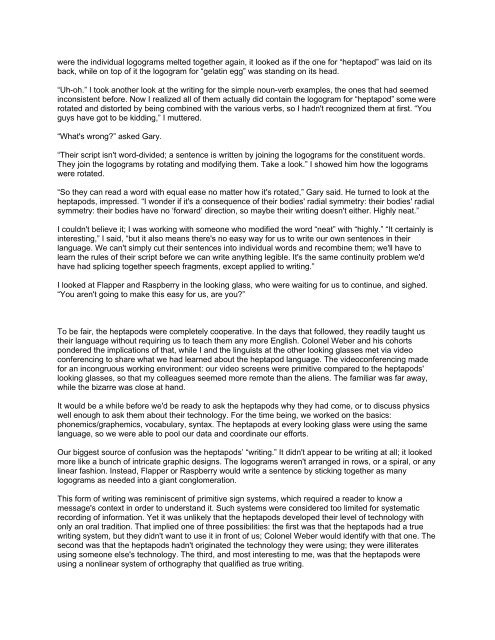You also want an ePaper? Increase the reach of your titles
YUMPU automatically turns print PDFs into web optimized ePapers that Google loves.
were the individual logograms melted together again, it looked as if the one for “heptapod” was laid on its<br />
back, while on top of it the logogram for “gelatin egg” was standing on its head.<br />
“Uh-oh.” I took another look at the writing for the simple noun-verb examples, the ones that had seemed<br />
inconsistent before. Now I realized all of them actually did contain the logogram for “heptapod” some were<br />
rotated and distorted by being combined with the various verbs, so I hadn't recognized them at first. “You<br />
guys have got to be kidding,” I muttered.<br />
“What's wrong?” asked Gary.<br />
“Their script isn't word-divided; a sentence is written by joining the logograms for the constituent words.<br />
They join the logograms by rotating and modifying them. Take a look.” I showed him how the logograms<br />
were rotated.<br />
“So they can read a word with equal ease no matter how it's rotated,” Gary said. He turned to look at the<br />
heptapods, impressed. “I wonder if it's a consequence of their bodies' radial symmetry: their bodies' radial<br />
symmetry: their bodies have no ‘forward’ direction, so maybe their writing doesn't either. Highly neat.”<br />
I couldn't believe it; I was working with someone who modified the word “neat” with “highly.” “It certainly is<br />
interesting,” I said, “but it also means there's no easy way for us to write our own sentences in their<br />
language. We can't simply cut their sentences into individual words and recombine them; we'll have to<br />
learn the rules of their script before we can write anything legible. It's the same continuity problem we'd<br />
have had splicing together speech fragments, except applied to writing.”<br />
I looked at Flapper and Raspberry in the looking glass, who were waiting for us to continue, and sighed.<br />
“You aren't going to make this easy for us, are you?”<br />
To be fair, the heptapods were completely cooperative. In the days that followed, they readily taught us<br />
their language without requiring us to teach them any more English. Colonel Weber and his cohorts<br />
pondered the implications of that, while I and the linguists at the other looking glasses met via video<br />
conferencing to share what we had learned about the heptapod language. The videoconferencing made<br />
for an incongruous working environment: our video screens were primitive compared to the heptapods'<br />
looking glasses, so that my colleagues seemed more remote than the aliens. The familiar was far away,<br />
while the bizarre was close at hand.<br />
It would be a while before we'd be ready to ask the heptapods why they had come, or to discuss physics<br />
well enough to ask them about their technology. For the time being, we worked on the basics:<br />
phonemics/graphemics, vocabulary, syntax. The heptapods at every looking glass were using the same<br />
language, so we were able to pool our data and coordinate our efforts.<br />
Our biggest source of confusion was the heptapods’ “writing.” It didn't appear to be writing at all; it looked<br />
more like a bunch of intricate graphic designs. The logograms weren't arranged in rows, or a spiral, or any<br />
linear fashion. Instead, Flapper or Raspberry would write a sentence by sticking together as many<br />
logograms as needed into a giant conglomeration.<br />
This form of writing was reminiscent of primitive sign systems, which required a reader to know a<br />
message's context in order to understand it. Such systems were considered too limited for systematic<br />
recording of information. Yet it was unlikely that the heptapods developed their level of technology with<br />
only an oral tradition. That implied one of three possibilities: the first was that the heptapods had a true<br />
writing system, but they didn't want to use it in front of us; Colonel Weber would identify with that one. The<br />
second was that the heptapods hadn't originated the technology they were using; they were illiterates<br />
using someone else's technology. The third, and most interesting to me, was that the heptapods were<br />
using a nonlinear system of orthography that qualified as true writing.


